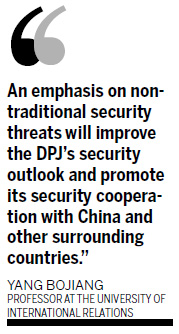Asia
Japan may change security policy focus
Updated: 2011-03-28 07:31
By Bao Daozu (China Daily)
BEIJING - Japan is likely to adjust its security policy to pay more attention to non-traditional security threats as a result of its natural disasters, said analysts.
The recent earthquake and tsunami in Japan have reminded the ruling Democratic Party of Japan (DPJ) that in a country frequented by natural disasters, more attention should be paid to non-traditional security threats, said Yang Bojiang, a professor at the University of International Relations in Beijing.
| ||||
The book, the third in a series written by Chinese scholars specializing in Japanese studies, deals with the major changes in Japanese politics, diplomacy, security, business, society and culture in 2010, especially the latest developments in Sino-Japanese relations.
"Sino-Japanese relations were tense in 2010" following the Diaoyu Islands incident on Sept 7, 2010, it noted.
"A lack of strategic mutual-confidence and a coordination mechanism to handle sensitive issues such as disputes over sovereignty is the basic reason for fragile bilateral relations."
|
|
Yang, author of the chapter on the DPJ's security policy, said after the natural disasters that hit Japan on March 11, there is an opportunity for Sino-Japanese relations, but the lack of strategic trust remains an obstacle. Shortly after the magnitude-9 earthquake and ensuing tsunami, China had prepared to send a rescue team with more than 100 members to Japan, but the Japanese government only accepted a 15-strong team, according to the Southern Metropolitan Daily.
"China made the utmost efforts to offer aid, but Japan is too cautious," said Li Wei, head of the Institute of Japanese Studies of the Chinese Academy of Social Sciences and chief compiler of the book.
"To rebuild Japan's economy and reshape its political security order after the earthquake is an inevitable responsibility for the current DPJ administration during 2011," said the abstract of the book.
E-paper

Rise and shine
The Chinese solar energy industry is heating up following recent setbacks in the nuclear sector
Bombs aim for regime change
CSI, with a twist
Literary path
Specials

Peony express
Growers of china's unofficial national flower are reaching out to europe for help

Tea-ing up
More turning to Chinese tea for investment opportunities like vintage wine

A cut above
The ancient city of Luoyang is home to a treasure trove of cultural wonders.





